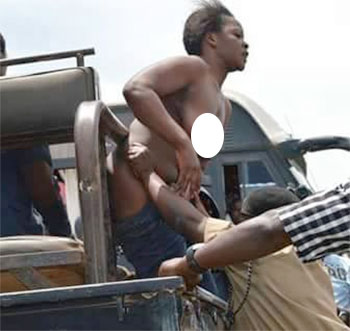By Jedidah Nguyo
Published April 8, 2015
 Terrorism is one of the biggest threats to civilization. Here in Kenya, it’s an all too familiar spectre as this eastern African country of 41 million has been on the receiving end more than once. That being the case, one would be shocked to learn that a filmmaker would create a film that depicts terrorists as normal human beings with dreams and hopes for a better tomorrow for themselves and their loved ones.
Terrorism is one of the biggest threats to civilization. Here in Kenya, it’s an all too familiar spectre as this eastern African country of 41 million has been on the receiving end more than once. That being the case, one would be shocked to learn that a filmmaker would create a film that depicts terrorists as normal human beings with dreams and hopes for a better tomorrow for themselves and their loved ones.
RELATED: Al-Shabaab Terror and Growing Religious Tensions Threaten East African Community Integration
SEPTEMBER, a 54-minute drama that portrays terrorists as normal, if not ordinary, people, has just been shown and discussed at the 84th monthly Lola Kenya Screen film forum (LKSff) in the Kenyan capital, Nairobi, where it was evaluated, debated and praised for what was described as “its good cinematography†and also for “looking at terrorism from a unique and sympathetic angle†by movie lovers who include critics, journalists, students, filmmakers, development workers and policy-makers. The film, directed by Mark Wambui, depicts the circumstances that cause people to become terrorists.
 Though SEPTEMBER that has been selected by Burundi International Film Festival (FESTICAB) and Zanzibar International Film Festival (ZIFF) for screening in April and June 2015, respectively received praise on the angle from which it tells the story, the film appeared to have planted many questions in the minds of the gathering than it answered. And the defensive nature of the director did not help the situation prompting one Reo Munene to ask the director if he had made the film for himself or for public consumption.
Though SEPTEMBER that has been selected by Burundi International Film Festival (FESTICAB) and Zanzibar International Film Festival (ZIFF) for screening in April and June 2015, respectively received praise on the angle from which it tells the story, the film appeared to have planted many questions in the minds of the gathering than it answered. And the defensive nature of the director did not help the situation prompting one Reo Munene to ask the director if he had made the film for himself or for public consumption.
RELATED: Kenya (nay, the world) Runs Out of Creative Ideas
The casting of the film was considered wanting. The choice of Brevick Ngereri Mugweru to play the role of George, an architect with a criminal past who went on to study architecture and whose work has changed the skyline of the city, was questionable. Such characteristics would have required an older man as opposed to the much younger Ngereri. The director explained that they had initially cast an older man for the role but he was not available during production and so they settled for a younger man; that the film was also supposed to show how bad politics affects the youth.
 A producer who identified herself as Eve felt that poor characterization in the film was caused by the fact that the cast did not want to take any risks. The director on his part felt that the cast did a good job, explaining that actors do not have to meet the expectations of the audience all the time. A big mistake!
A producer who identified herself as Eve felt that poor characterization in the film was caused by the fact that the cast did not want to take any risks. The director on his part felt that the cast did a good job, explaining that actors do not have to meet the expectations of the audience all the time. A big mistake!
RELATED: In Patriotism Lies the Solution to Kenya’s National Problems
On the use of flashbacks, the director said he realized that some things in the film were not coming out clearly and opted to use flashbacks to help bring them out. He however apologized for any shortcomings in the film.
SEPTEMBER is one of the films that Mark Wambui who says he holds a degree in broadcast journalism from United States International University in Nairobi. His other films include KEEPING IT TOGETHER that depicts the delicate balance maintained by five friends as they cope with challenges and DECEIT that addresses infidelity among couples and which was nominated at the 2014 Africa Magic viewer’s choice Awards (AMVCA) and selected by the 35th Durban International Film Festival of South Africa.
 Present during the screening, discussion and networking forum was director Wambui with Mark Kaiyare (writer, actor and executive producer), Saum Idd (co writer), Felicia Wanjiku (cinematographer), Gregory Mungai (visual effects artist), Jacqueline Sila (assistant producer) and Victor Oloo (producer).
Present during the screening, discussion and networking forum was director Wambui with Mark Kaiyare (writer, actor and executive producer), Saum Idd (co writer), Felicia Wanjiku (cinematographer), Gregory Mungai (visual effects artist), Jacqueline Sila (assistant producer) and Victor Oloo (producer).
Robin Steedman, a doctoral student at the School of Oriental and African studies of the University of London addressed the audience on her research on contemporary Kenyan filmmakers. She said she had chosen to do her research in Kenya that has more female filmmakers than any other African country. S She is focusing on the works of Wanuri Kahiu, Judy Kibinge, Ng’endo Mukei and Hawa Essuman whose creativity, she said during her presentation in the ‘Expert Speak’ slot, cuts across all genres. Her research also focuses on industry development and film distribution to which, she said, Lola Kenya Screen film forum had proven very helpful in her research.
 HOPES AND DREAMS, a fictional film made by children from Kenya, Uganda, Tanzania, Rwanda and Burundi in the framework of the 9th Lola Kenya Screen festival in 2014, was screened to a highly attentive audience. Every LKSff usually showcases a film made by, for or with children to promote children’s content in Africa that doesn’t usually focus on this type of content.
HOPES AND DREAMS, a fictional film made by children from Kenya, Uganda, Tanzania, Rwanda and Burundi in the framework of the 9th Lola Kenya Screen festival in 2014, was screened to a highly attentive audience. Every LKSff usually showcases a film made by, for or with children to promote children’s content in Africa that doesn’t usually focus on this type of content.
RELATED: Simona Abdallah is the only Woman in the World who Plays a Masculine Music Instrument
TEN YEARS OF LOLA KENYA SCREEN trailer marking a decade of Africa’s premier movie platform for children and youth, was also screened. Lola Kenya Screen was founded in 2005.
 The next LKSff, the 85th, is scheduled for April 27, 2015 at Goethe-Institut that has since 2005 partnered with ComMattersKenya/ArtMatters.Info on this project that seeks to promote motion pictures business in eastern Africa.
The next LKSff, the 85th, is scheduled for April 27, 2015 at Goethe-Institut that has since 2005 partnered with ComMattersKenya/ArtMatters.Info on this project that seeks to promote motion pictures business in eastern Africa.
To be screened shall be KISWAHILI SAVES THE DAY by East African Community children aged 10-16 years under the Lola Kenya Screen’s umbrella and TOGETHER by Rodger James of Gilgil in Kenya’s Rift Valley region.
RELATED: Nairobi Youth Delivers Contemporary Movies through Patience, Perseverance and Persistence
Also lined up for screening is STOP THE NOISE by Environmental Film Festival of Accra 2010 which raises awareness on environmental issues.




